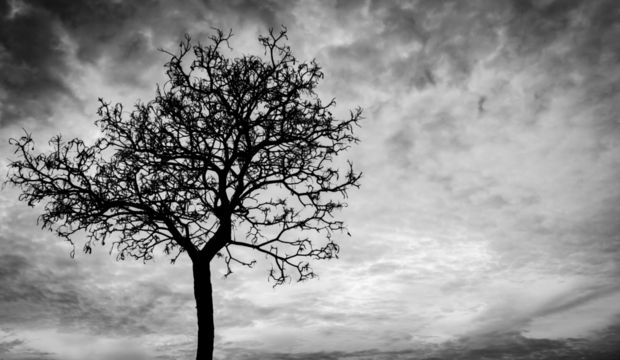What I am curious about is not the question “Is there life after death?”, but the expression “There is life with death”. There is life with death. When I die, I will never be able to go for a walk with my children, spend time with them and sip my morning coffee. After all, there is death in this world.
My first encounter with death started in a quite early period of my life with a difficult birth I put my mum through. Umbilical cord, whose real function is to connect the baby with life, did not serve its function within its defined framework, which resulted in an important labour complication i.e. umbilical cord prolapse which caused my mum to have a near death experience. This event urged me to think about death from early ages. How many children use the word death even kill within a sentence? I was one of them. “My birth was difficult, so I almost died” or “I could have killed my mum, my mum could have died.” Why the cord which is supposed to provide blood and nutrient for me went crazy and tried to suffocate me or why I went mad and could not tolerate my life source coiling around my neck has been an issue about which I have been thinking extensively. At the age of ten, when I was still going on questioning the first experience in curiosity, I witnessed the death of my grandmother while she was having her meal. My grandmother, just discharged from hospital after her treatment of gastric bleeding, was as fit as a fiddle except her stomach and could live to a hundred according to her doctors. Her death from choking on boned chicken was much earlier than our expectations. My grandmother’s unexpected death in front of my eyes urged me to ponder over rapidly changing life conditions. You are here one moment and the next you are gone. It seemed unbelievably weird. The first feeling I had was astonishment before sadness. I was perplexed that everything could change before you know it.
My close elder relatives also died in a short time to shock the remaining family members without long-term illness periods. My grandfather died of heart attack, my other grandmother from cerebral haemorrhage, my father due to cardiac arrest. Perhaps they left us in a way that could be defined as “good death” by many, before having one foot in the grave. Apart from their pain, this kind of deaths made me question the concept of transience, not death itself; those deaths were the time when I was about to grasp the concept of absence of permanent and lasting entity.
Death as permanent guest in our home started with my son’s illness 14 years ago. My son, whose left hemisphere started to get smaller as a result of 45-minute-seizure, was diagnosed with a rare neurological illness and we were told to wait as it was unknown in what way the disorder would develop. In this waiting period lasting approximately 1.5 years, among the probabilities such as “the brain shrinkage could continue and result in death” or “it could be a one-time thing, could have hit and gone and you will live with the remaining damage”, “experience stopping” was presented to us. A grey area where the result is unknown.
Death is an issue we believe we have the privilege to postpone thinking about. As luck would have it, it is also one of the rarest topics we cannot make a conditional sentence about. What a grave dilemma! For example, none of us could say “if I die”. No human being reading this article will be here a hundred years later. Simply put, we die because we were born, however.
My privileged situation which I had created in my mind and which was not true at all disappeared. I was taken away the comfort to use such repeated toxic expressions like “somehow we will all die, why bother now?”. In fact, this was the awareness that death is always with us and it did not go away as fast as the other deaths in the family. It has reminded its existence and kept on being with me in such a way not to give me a chance to forget.
I had a guest whom I did not know how long would stay and with whom I did not know what to do. I did not have a manual, or I did not know how to host it. What’s worse, this guest had taken away my ability to go on life like I used to.
In the initial stages of the treatment, we spent the night at a floor where children diagnosed with cancer and their attendants stayed due to the necessity of maximum one drop of a drug mixing with blood. Attendants consisted of mothers and when our admission to the floor was completed, every mother there approached me and said “May God save (you)” patting me on the back. That was it. Perhaps it was the only thing to say when there was nothing to talk about and words converted into prayers. They had spent so much time in this process that this plain acceptance/prayer emerged as a result of the sadness created by the probability of not being able to see their children again combined with remembering the existence of death every day uniting with life. Not “Get well soon”, but “May God save (you)”.
During the illness, death gradually was not only a piece of information for me. Doctor visits, drugs, cures, hospitals…Death was none of them. It was being gone from the world. Where I am gone from here, my reincarnation belief, and the concept of life in other forms after death primarily did not matter much. With my experiences, I had now an idea of something’s being gone and not being here anymore. The reality death wanted me to understand was this. Seeing the place and naturality of death in lifecycle without adding other meanings to it. Ending of life in this world and me remaining with all the reflections of it.
My son’s brain shrinkage is called atrophy in medicine. It is defined as the reduction in size of a normal-scaled organ afterwards. However, when its origin is considered, it means a waste or wasting away through lack of nourishment. When I used the word metaphorically and applied it to my life, I always thought of the following question: “Waste of what or what was wasted?”.
Waste of life.
When life is not wasted and when it is attributed meaning, death acquires meaning.
Here it is. When I feel this connection, experience it a little and live with it, a lively bond emerges between all my activities, thoughts, feelings and the world; not like a book that I finish reading and put away. I can see how meticiously I weave this bond, how everything related to me and the world interacts with each other and how lively I keep all of these. This area is a magical one in which even the ordinary things I do have a meaning. In this magical area, nothing I live loses its meaning, difficult experiences still compel me, but I move into a witnessing state elegantly and curiously. Without forcing me to choose one, my sadness and joy and my rebellion and acceptance could coexist.
Life is so big that it is more than all of us. It is not restricted by my personal life. What is restricted is perhaps my understanding. I do not view death as the opposite of life. On the contrary, death makes room for life. Death exists for the continuity of life. How I live my life influences how I experience death. If there is atrophy in my life, it is impossible for me to accept death. Apart from this, intense sorrow (sometimes its rebellion) of not being able to see my children again coexists with my admiration for the greatness of life and the acceptance of the service to its continuity by my dying.
I see that life is not something related to me, but I am something related to it. So is death.





YORUMLAR